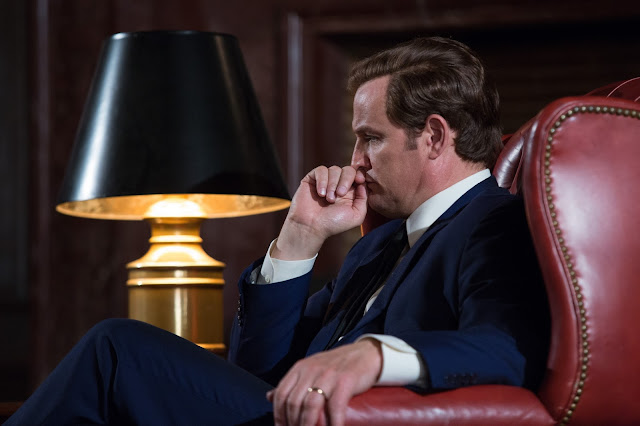Review | Chappaquiddick | 2018
The story of how Ted Kennedy drove a car off a bridge while under the influence of alcohol in Chappaquiddick in 1969, killing campaign secretary Mary Jo Kopechne, was a political scandal that somehow managed to pass into history almost unnoticed. Kennedy survived, of course, going on to become one of the longest-serving and most widely respected Democratic senators in modern history, but he never quite fulfilled the political promise that he (and his family) hoped. John Curran's Chappaquiddick asks us to re-examine that history; not necessarily to re-examine Kennedy, but to take a closer look at how history is written, and how power and privilege create a different set of rules for those born into them.
Through Jason Clarke's uncanny embodiment of Kennedy, Chappaquiddick becomes a character study of a weak and broken man simply trying to live in the shadow of his more successful brothers. When his car goes off the road and into a pond, rather than try to save Kopechne (Kate Mara), Kennedy wanders off in a daze, more concerned with how this will affect him politically than for the life slowly fading away, still trapped in the car. It was later revealed that Kopechne was still alive for quite some time after the accident, and had suffocated trying to keep her head above water rather than drowned. But Kennedy set right to work trying to cover it all up with the reluctant help of his cousin, Joseph Gargan (Ed Helms) and US attorney Paul Markham (Jim Gaffigan), not reporting the accident until the next morning when Kopechne was already dead.It isn't long before the Kennedy family goes into damage control mode, even going so far as to bring in former Secretary of Defense Robert McNamara (Clancy Brown) to guide the coverup. All the while Ted seems to be floundering, making a series of terrible decisions in his desperation to live up to the family name. Chappaquiddick works best when its examining the outrageous benefits of Kennedy's privilege, blowing the lid off the way politicians are able to manipulate media narratives to their own benefit (Kennedy had the good fortune to get into trouble when the moon landing was dominating headlines). As a character study it falters somewhat, saddling Kennedy with some crippling daddy issues but not going much deeper than that.
Still, Clarke's performance is strong, saddled with layers of pain and regret, and the script by Taylor Allen and Andrew Logan mines some fascinating political drama out of the story. It may not provide much insight into Kennedy's lack of action, but it does provide a darkly funny and often chilling look at the effects of unchecked privilege and the manipulation of the media for political gain. Whether or not it was right for the voters of Massachusetts to overlook this event and continue to elect Senator Kennedy (who by all accounts went on to become an effective and well-respected representative for his constituents, earning the nickname "lion of the Senate") is left up to the audience, but one can't help but see modern parallels in the way politicians, regardless of party affiliation, continue to spin stories in the national media for their own benefit. Meanwhile, Americans slowly drown while their representatives squabble amongst themselves, trying to figure out how to turn their death into a political victory.





Comments